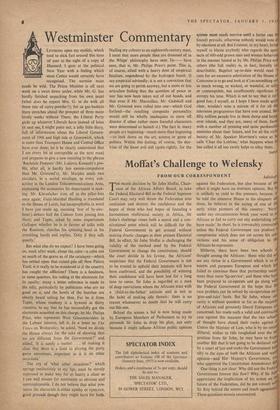Moffat's Challenge to Welensky
FROM OUR CORRESPONDENT
111) Salish
rr HE recent decision by Sir John Moffat, Chair- ' man of the African Affairs Board, to take the Federal Electoral Bill to the Federal Supreme Court may very well throw the Federation into confusion and destroy the confidence and the hopes of those who had hopes of founding a harmonious multiracial society in Africa. Sir John's challenge raises both a moral and a con- stitutional point which will be difficult for the Federal Government to get around without making drastic changes in their present Electoral Bill. In effect, Sir John Moffat is challenging the validity of the method used by the Federal Government to change the constitution; should the court decide in his favour, the Africans' suspicions that the Federal Government is not to be trusted to uphold their interests will have been confirmed, and the possibility of winning their confidence will have been lost for a long time to come. Sir John is regarded as a man of deep convictions whom the Africans trust with a `child-to-the-father' attitude and is not in the habit of making idle threats : there is no reason whatsoever to doubt that he will carry out this one.
Behind the scenes a bid is now being made by European Members of Parliament to try to persuade Sir John to drop his plan, not only because it might inflame African public opinion against the Federation, but also because of the effect it might have on overseas opinion. But he is unlikely to yield to this pressure, because, a1 he told the attentive House in his eloquent ad' dress, he believes in the saying of one of the early white pioneers of this country : `Ncvet under any circumstances break your word to 01 African or fail to carry out any undertaking yet have made.' In short, he is irrevocably committed unless the Federal Government can produce e compromise which does not cut across his con victions and his sense of obligation to the Africans he represents.
Hitherto, there have been two schools 0 thought among the Africans: those who did no see any virtue in a Government which is to all intents and purposes European and which 113 failed .to convince them that partnership means more than mere 'lip-service% and those who have been prepared to co-operate and go along with the Federal Government in the hope that the race problem can be solved by co-operation on `give-and-take' 'basis. But Sir John, whose sin cerity is without question so far as the majorit of Africans and genuinely liberal Europeans are concerned, has made such a valid and convincing case against this measure that the two school of thought have closed their ranks against X Unless the Minister of Law, who is by no mean illiberal, wishes to ride roughshod over the oil position from Sir John, he may have to frt another Bill that is not going to be declared Vold by a court of law and make the Government lool‘ silly in the eyes of both the Africans and world opinion—and Her Majesty's Government, 0° who approved the Constitution Amendment Bill One thing is not clear. Why did not the Federal Government foresee this flaw? Why, if Sir JO" appreciates the implication of his action on the future of the Federation, did he not consult with Sir Roy behind the scenes and reach agreement These questions remain unanswered.










































 Previous page
Previous page